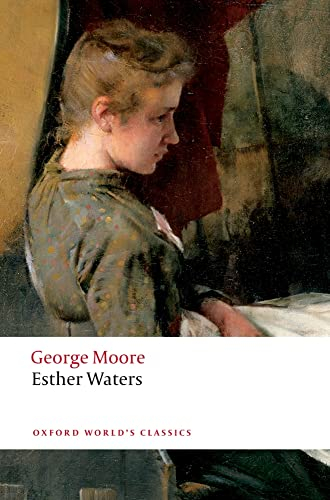Synopsis
"Esther Waters" (1894) was one of the first English novels to defeat Victorian moral censorship. George Moore's story of a mother's fight for the life of her illegitimate son won Mr Gladstone's approval and was admitted, unaltered, into those bastions of Victorian conformity, the circulating libraries.
Esther Waters is forced to leave home and become a servant in a well-to-do household. Seduced in a moment of weakness, she has to leave her position and the novel charts her poignant story of poverty and hardship : first the lying-in hospital, then service as a wet-nurse, and even the workhouse as she struggles to look after her child. Adapting the French literary practices of sexual frankness and social exploration to the British climate, Moore produced his masterpiece in "Esther Waters". A landmark in publishing history, it is also one of the finest of naturalistic novels.
Esther Waters is forced to leave home and become a servant in a well-to-do household. Seduced in a moment of weakness, she has to leave her position and the novel charts her poignant story of poverty and hardship : first the lying-in hospital, then service as a wet-nurse, and even the workhouse as she struggles to look after her child. Adapting the French literary practices of sexual frankness and social exploration to the British climate, Moore produced his masterpiece in "Esther Waters". A landmark in publishing history, it is also one of the finest of naturalistic novels.
Titre original : Esther Waters (1894)
Moyenne
14.0
1 vote
MOYEN
1 édition pour ce livre
2008 Editions Oxford University Press (World's classics)
398 pages
ISBN : 9780199549832
Qui a lu ce livre ?
1 membre a lu ce livre
Aucun membre ne lit ce livre
Aucun membre ne veut lire ce livre
1 membre possède ce livre
chronique de blog
Aucune chronique de blog pour le moment.
En vous inscrivant à Livraddict, vous pourrez partager vos chroniques de blog !



Pour poster un message, il faut être inscrit sur Livraddict
Porté par une héroïne moderne, indépendante, surmontant préjugés et injustices, ce roman de la fin de l'ère victorienne offre un discours qui s'affranchit davantage des conventions sociales, morales, didactiques et du sentimentalisme en vigueur dans le roman traditionnel. Cependant, le réalisme prosaïque et l'écriture dénuée de lyrisme m'ont globalement gardée à distance de ce récit.